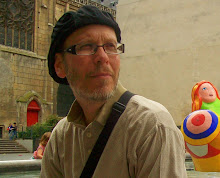A quick backtrack before moving forward:
I keep thinking about the March 30th journal excerpt and the fact that J--, the co-worker killed in a motorcycle accident, was black. Would that explain C--'s crass communication of his death? If it had been one of the white workers who had died in the same way, would C--, white himself, have conveyed the information in a similar manner? And what about me? Would it have had more impact on me if he had been white?
I keep struggling with the ideas of "masculinities" because it seems so amorphous that I can't wrap my head around it. It's easy to say that when you add whiteness to masculinity or blackness, it becomes racially pluralized. And maybe those differences were at play some 22 years ago on the newspaper dock, but it becomes even more complicated when you consider that there's no one whiteness or blackness. So you have whitenesses and masculinities, for instance, mixing in unpredictable and blurry ways.
I'll undoubtedly keeping trying to make more sense of those pluralities, but for now onto the excerpt:
"Woke up about 1:30 pm today. I didn't feel like drawing or writing, so I decided to go to some bookstores to try and add to my collections of Gor, Dray Prescot and Tarzan books. Mom and Linda went with me. We first went to a nursery (plants) out by the South Plains Mall. Mom had seen some hanging plants that she wanted to buy there. I had to loan her $20 so she could buy one. Dad had come with her the first time she saw the plants, but wouldn't let her buy any. We then went to Trails End Bookstore. The science fiction books there are about 1/3 higher that the rest of the books. That's ridiculous. I doubt if I'll be going there much more. I don't like the place, even though I've given them much business in the past. We checked out a new used bookstore on Ave. Q and it was pitiful. No selection at all. They also sold tools in the bookstore. Tools and books, what a combination. The proprietor smoked cigars, so the store really stunk. Then we went to the Book Rack once again. I love their 20 cents and 10 cents shelves. There is nothing better than getting a book, even if it is a little beat up, for 20 cents."
MANHOOD REDO: Where to start? First of all, I had never been much of a reader until up to this point, unless you count comic books, which I consumed voraciously (when I write about 'giving Trails End much business in the past,' it was in reference to buying stacks of used comics for a nickel each, then taking them back to trade two-for-one), so my masculinity had not been defined by book or school intelligence. At this point in my life, I had dropped out of college after attending for two years, my overall grade point dropping to a 1.93. I had never been studious, never made more than adequate grades that sometimes slipped into the D range, although never F. Everyone thought I was smart enough; I just didn't, as my seventh grade reading teacher said, apply myself.
Nowadays there's considerable discussion about how schools fail to help boys, that too many of them, compared to girls, do poorly. That seems overly simplistic to me and overlooks the ways masculinity often does a disservice to boys in the educational system. I know that I had the typical attitude prevelant in West Texas but also elsewhere: booklearning was, in the language of now, for punks. I already had strikes against me when it came to performing a cool masculine poise; I didn't want to add to them.
It took me a long time to overcome this attitude, so much so that when I returned to school and eventually went on to get graduate degrees, when I made nothing but As in classes, when I became passionate about literature, writing, and rhetoric, I kept thinking, I can do this but I'm not a true academic. I want a masculinity that allows boys the freedom to learn, to hold onto their deep-seated curiosities and desires to know that start the minute they're born.
Subscribe to:
Post Comments (Atom)

No comments:
Post a Comment